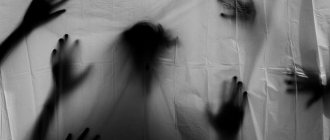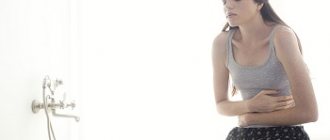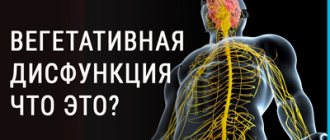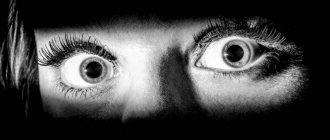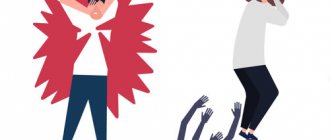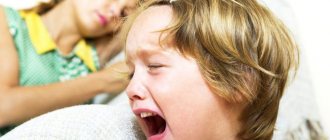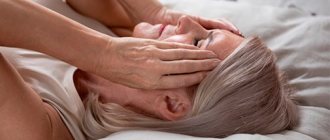A sudden panic attack can occur at night - before bed, during, and also in the early morning after sleep. Panic attacks during sleep are accompanied by the same symptoms as daytime vegetative crises: in addition to a strong feeling of fear, a person experiences suffocation, as if he does not have enough air, his heartbeat quickens, trembling appears in the limbs, less often - numbness, chills run through the body, and cold sweat, often during an attack there is an upset stomach, and the feeling of anxiety increases. A person has a desire to go out into the air to “breathe,” call an ambulance, or remain completely motionless under the blanket, waiting out an attack of “horror.”
Panic attacks during night sleep are often confused with a heart attack, with a normal reaction to a nightmare, or even with mild mental confusion. However, the fact that a person cannot fully rest and get enough sleep during a night’s sleep is clear evidence that the balance between the mechanisms of excitation and inhibition, for which the autonomic part of the nervous system is responsible in our body, is disturbed. At the chemical level, this process in the human body is manifested by an imbalance between the production of adrenaline, norepinephrine and acetylcholine. The production of the latter becomes insufficient to “extinguish” the stimulating effect of adrenaline on the body, which is why the above-described condition occurs.
It should be noted separately that caffeine-containing drinks consumed late in the evening or early in the morning also often cause a panic attack in patients with impaired functioning of the autonomic nervous system.
Panic attack before bed
A panic attack at night often results in insomnia. The patient cannot sleep for hours, experiencing increasing anxiety. This state develops into a feeling of extreme fear, up to the fear of going crazy and even dying.
Anxiety can arise without obvious reasons, but more often it is caused by important events of the upcoming day: a significant meeting, speech, exam, trip, etc. The attack is accompanied by obsessive thoughts: what if something doesn’t work out? What if I find myself in an awkward situation? what if I feel bad?
Any stress factors can serve as an additional catalyst that triggers the development of a panic attack at night. Thus, an unstable psycho-emotional state caused by problems in the family, at work, with money or health also creates favorable conditions for the development of night attacks. In this case, the patient is visited by obsessive thoughts related to the current state of affairs.
The patient himself may associate his “nervousness” and irrational behavior with increased emotionality and anxiety characteristic of him “in life”, and for a long time ignore his painful condition or alleviate it with the help of sleeping pills or antidepressants.
Undoubtedly, a person’s personal qualities, such as increased anxiety or emotional sensitivity, become the basis on which a disorder of the autonomic nervous system can develop. However, this is not a reason to ignore such manifestations of this disorder as panic attacks, since by letting the disease take its course, we aggravate its harmful effect on our entire body.
Thus, with a milder form of autonomic disorder, the patient may experience stomach problems only directly during his nightly “experiences.” However, in a patient whose disease is already at a more advanced stage, gastrointestinal distress is observed constantly, including during the daytime, even with the slightest mental, emotional or physical stress. That is, the body cannot withstand the systematic load at night and the lack of proper rest during night sleep, the “spring” of the ANS, which is responsible for excitation and inhibition in our nervous system, eventually completely fails and the autonomic nervous disorder progresses. Therefore, it is important to prevent the development of a disorder of the autonomic nervous system as early as possible.
Diagnostics
How can you suspect sleep apnea disease? Patients suffering from this disease, as a rule, have a very characteristic appearance, described by Charles Dickens in the character Joe in The Pickwick Papers: “He was a fat man with a short neck and a red face, who constantly fell asleep and began to snore in the most uncomfortable situations ..."
There are quite simple schemes with which you can suspect the disease and prescribe additional examination.
If three or more of these signs are present (or only the first sign), an in-depth study is necessary:
- Indications for sleep apnea.
- Loud or intermittent (with snoring) nighttime snoring
- Frequent urination at night
- Long-term night sleep disturbance (> 6 months)
- Increased daytime sleepiness
- Obesity
- Arterial hypertension (especially night and morning)
The easiest way to identify sleep apnea is to observe a sleeping person. Usually, immediately after falling asleep, a person begins to snore. Soon the patient suddenly stops breathing. At this time, no breathing sounds are heard, and snoring stops. However, the patient is trying to breathe, as can be seen from the movements of the chest and abdominal wall. After about 15-30 seconds, the person snores loudly and takes several deep breaths. As a rule, the patient's sleep is very restless: he turns around in bed, moves his arms and legs, and sometimes says something.
The frequency and duration of respiratory arrest depends on the severity of the disease. In severe forms of the disease, cyclic breathing stops occur almost immediately after falling asleep and in any body position. In less severe forms, this occurs only in the deep stages of sleep or when the patient sleeps on his back. Breathing problems are often associated with alcohol intake. Sometimes snoring and stopping breathing occur only after a significant dose of alcohol taken shortly before bedtime.
Panic attack in a dream
In the middle of the night, people with a disorder of the autonomic nervous system are often disturbed by sudden awakenings, which seem to “throw out” a person from sleep – “like a jolt.” Sudden awakenings can be accompanied by so-called “nightmarish” dreams, which are often perceived by the patient as the main cause of fear, rapid pulse, chills, sweating and other symptoms, which are actually direct symptoms of a panic attack at night.
“Nightmares” often accompany a panic attack during sleep and are direct evidence of an autonomic nervous system disorder. This phenomenon is also associated with the excessive production of adrenaline in the blood even at a time when our body is trying to tune in to rest: the harmonious unity of the chemical processes occurring in our body is disrupted, and sleep is abruptly interrupted.
Treatment
Currently, the following methods of treatment for snoring and obstructive sleep apnea syndrome are used:
- Laser plastic surgery of the soft palate
- Uvulopalatopharyngoplasty . This long term lists the names of those tissues of the pharynx that are removed in order to increase the lumen of the airways at the level of the pharynx (tonsils, palatine arches, uvula). The operation is used to treat sleep apnea. The intervention gives only about 50% positive results and is very painful. In addition, after 5-7 years, tissue at the level of the pharynx can grow again and lead to relapse of the disease. Recently, this operation has been used quite rarely.
- Creation of constant positive pressure in the airways CPAP therapy) . Currently, this is the most common method of treating severe forms of sleep apnea disease.
Honored Doctor of the Russian Federation, Professor, Doctor of Medical Sciences Buzunov Roman Vyacheslavovich
Panic attack after sleep
A panic attack may occur in the early morning. Long before the alarm clock is supposed to ring, a person suddenly wakes up from a strong feeling of causeless anxiety and can no longer fall asleep. The attack is accompanied by obsessive thoughts and feelings of “being overwhelmed” and tired. A person does not feel rested, but can no longer fall asleep. Symptoms of a panic attack after sleep: a person suddenly wakes up in strong anxiety, reaching the fear of death, feels chills or, conversely, a rush of heat, the heartbeat is rapid, there is trembling in the body, a headache, nausea or diarrhea are possible.
A person who has had a panic attack before, during or after a night's sleep experiences a loss of strength in the morning and throughout the day, loses interest in life, and has a fear of leaving the house, going to work or school, that is, new panic attacks occur. attacks. At the same time, an additional burden is placed on the entire body, the psycho-emotional background worsens, and, as a result, the disease progresses. Subsequently, the patient is afraid to go to bed again, since the fear of fear itself arises, which becomes a faithful companion of night sleep. Thus, the person’s condition only worsens. Therefore, it is very important to identify and diagnose a disorder of the autonomic nervous system, manifested by a panic attack during night sleep, at an early stage of development and put your nervous system in order.
The Clinical Center for Autonomic Neurology offers innovative methods for diagnosing and treating panic attacks at night using direct physical influence on the autonomic nerve nodes using various physiotherapeutic methods. The effectiveness of this treatment has been tested over the years and with positive results from the treatment of our patients.
Treatment of panic attacks in Moscow
Causes of sleep disturbances
Insomnia is a condition that requires mandatory correction. To do this effectively, you need to understand why sleep disturbance occurs. By origin, insomnia is of two types: primary and secondary. Primary is true insomnia, which is an independent disease and is diagnosed after excluding other causes. Secondary insomnia is a side effect of another condition. In this case, in the absence of sleep, the reasons may be somatic diseases or taking medications.
Sometimes insomnia lasts only a few days and goes away on its own. This is an acute condition caused by significant events, for example, an exciting speech at a conference or an exam. In other cases, insomnia becomes persistent and persistent. In chronic sleep disorders, the causes are related to deeper psychological or physiological problems that need to be addressed. To be diagnosed with chronic insomnia, symptoms must occur 3 times a week for a month or more.
The main reasons for lack of sleep in an adult are:
- Poor sleep hygiene: constant shift of biological rhythms, fatty and dense foods before bedtime, poorly ventilated room, watching TV, using tablets, smartphones and other devices with blue spectrum radiation.
- Somatic diseases: insomnia can be associated with conditions such as bronchial asthma, diabetes mellitus, thyrotoxicosis, GERD, oncology and others.
- Mental illnesses: anxiety disorders, depression and neuroses are common causes of sleep disturbances.
- Taking medications: A side effect of some medications is sleep disturbance.
- Chronic stress: ongoing life difficulties or unprocessed traumas.
- Alcohol, coffee and nicotine: These products are stimulants. If you consume them before bed, this is most likely what is causing your sleep disturbance. Alcohol can help you fall asleep, but it disrupts deeper stages of sleep. Because of this, sleep becomes shallow and frequent awakenings occur.
- Older age: Older people are more likely to develop insomnia. This is due to a decrease in physical activity, a large number of chronic diseases and medications taken, and changes in the social sphere. Older people are susceptible to depression, chronic pain conditions, and urge to urinate at night.
- Female: The menstrual cycle and menopause lead to hormonal changes that can disrupt sleep. Insomnia also occurs during pregnancy.
There are many reasons why sleep is disturbed. Some of them are clear at first glance, but sometimes a specialist is needed for diagnosis. It is important to correctly determine the cause, because to fully get rid of the disorder, it is necessary to eliminate the provoking factor.
What to do if you have sleep disturbances
Sleep is essential for maintaining health. If you are wondering what to do in case of sleep disturbances in order to get enough sleep again, then first of all you need to pay attention to your habits. Sometimes, to normalize sleep, it is enough to follow these tips:
- Go to bed and wake up at the same time
- Make sure the sleeping area is comfortable and the room is well ventilated
- Avoid electronic devices less than 40 minutes before bedtime. Their use can lead to loss of sleep due to the bright artificial light of blue screens, which suppresses the production of melatonin, the sleep hormone.
- Spend at least 30 minutes outside every day
- Add physical activity and sports to your life, but avoid exercising before bed - this can have a stimulating effect and make it difficult to fall asleep
- Use relaxing breathing techniques before bed
- Go to bed in a calm state: working from home, watching movies or loud music can aggravate the sleep disorder, which is absolutely not possible. Avoid activities before bed that may make you anxious
- Avoid alcohol, caffeine, and nicotine a few hours before bedtime
- Don't eat heavy foods or drink a lot of liquid two to three hours before bedtime
The listed recommendations can work for mild forms of insomnia without serious mental or physical causes. In other cases, if your sleep is disturbed, only an experienced specialist will tell you what to do.
